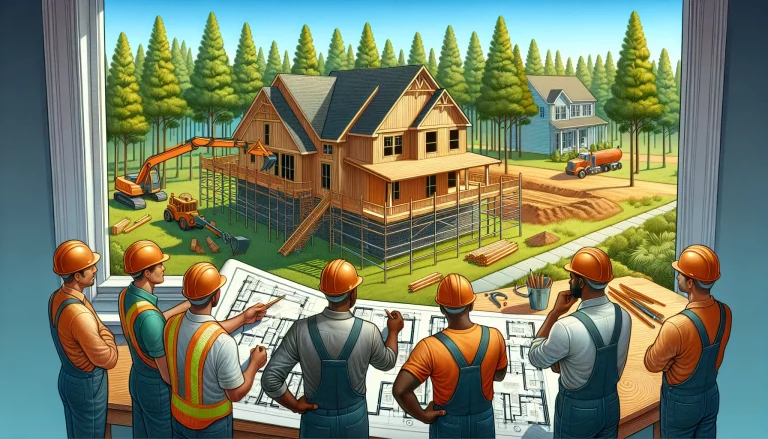Key Takeaways
- Understanding the Process: Familiarize yourself with the steps involved in purchasing a new construction home to make informed decisions throughout the journey.
- Benefits of New Construction: New homes often feature modern designs, energy-efficient systems, and customization options that can enhance your living experience and reduce long-term costs.
- Research Builders: Thoroughly evaluate builders and developers based on their reputation, experience, and customer reviews to ensure quality and reliability.
- Financing Options: Explore traditional and specialized loans available for new construction homes to find a financing solution that best suits your financial situation.
- Purchase Agreement Essentials: Carefully review the purchase agreement, focusing on key terms and contingencies to protect your interests and avoid misunderstandings.
- Conduct Inspections and Walkthroughs: Don’t skip home inspections and final walkthroughs; these steps help ensure the property meets your expectations and is free from hidden issues before finalizing the purchase.
Buying a new construction home can feel like stepping into uncharted territory. With so many choices and decisions to make, it’s easy to feel overwhelmed. We’re here to simplify that journey for you. Understanding the new construction home buying process is crucial for making informed decisions that align with our needs and desires.
From selecting the right builder to navigating financing options, every step matters. We’ll explore the ins and outs of this process, helping us avoid common pitfalls and ensuring we get the most value for our investment. Whether we’re first-time buyers or seasoned homeowners, our guide will equip us with the knowledge to confidently embark on this exciting adventure.
Understanding The New Construction Home Buying Process
The new construction home buying process involves several critical steps vital for ensuring we make informed decisions. Recognizing these steps helps us navigate the complexities of purchasing a new property effectively.
Importance of New Construction Homes
New construction homes offer benefits that existing homes may not provide. They often showcase modern designs and energy-efficient features, which can lead to cost savings on utilities. We appreciate customization options, allowing us to personalize layouts and finishes according to our preferences. Moreover, these homes typically come with builder warranties, offering peace of mind against potential defects. The evolving housing market highlights the demand for new construction as buyers seek properties that align with contemporary lifestyles.
Key Differences From Existing Homes
Understanding the key differences between new construction and existing homes is essential for informed decision-making. New construction homes generally feature modern building materials and adhere to current safety standards, reducing the likelihood of repairs shortly after purchase. Unlike existing homes, new builds often provide energy-efficient appliances and heating systems, translating into lower long-term expenses. Additionally, the timeline for move-in can differ; with new constructions, delivery dates may extend based on various factors like weather and permits. Knowing these distinctions helps us weigh the advantages and disadvantages before diving into the purchase.
Steps Involved in The New Construction Home Buying Process

Understanding the steps in the new construction home buying process guides our approach, ensuring a smooth experience. Each phase presents opportunities and challenges that require careful consideration.
Researching Builders and Developers
Researching builders and developers forms the foundation of buying a new construction home. We evaluate prospective builders based on their reputation, experience, and customer reviews. Key factors include their previous projects, adherence to timelines, and responsiveness to inquiries. For instance, choosing a builder with a strong track record ensures quality craftsmanship and reliable timelines. It’s wise to visit model homes and talk to current homeowners about their experiences. Acquiring information from local real estate agents can also uncover insights into builder credibility. This thorough investigation fosters informed decision-making and builds our confidence in a significant investment.
Selecting a Location and Community
Selecting the right location and community plays a crucial role in our new construction home buying journey. We prioritize factors such as proximity to work, schools, and essential amenities when considering neighborhoods. Additionally, understanding community dynamics, such as safety, local services, and recreational opportunities, informs our choices. For example, communities with planned developments often offer modern infrastructure and shared amenities, enhancing our lifestyle. Exploring future growth prospects in designated areas may also increase property value over time. Balancing these elements helps us choose a location that aligns with our needs and long-term goals in homeownership.
Financing Options for New Construction Homes

Navigating financing options for new construction homes presents unique challenges and opportunities. Understanding these choices helps us make informed decisions for our investment.
Traditional Mortgages
Traditional mortgages serve as a common financing method for new construction homes. These loans typically include fixed-rate options, offering predictable payments for the life of the loan. Banks and credit unions usually provide these mortgages, requiring a down payment between 3% to 20%, depending on the loan type and lender. Borrowers must demonstrate good credit, sufficient income, and stable employment to qualify. We often recommend getting pre-approved before house hunting, as this step clarifies our budget and strengthens negotiation positions with builders.
When financing a new build, we need to account for the extended timeline of construction. Lenders may suggest using a construction-to-permanent loan, which converts to a permanent mortgage upon completion. This type simplifies the financing process, as it encompasses both construction costs and long-term mortgage funding. Understanding these options can enhance our financial safety and smooth the buying process.
Specialized Loans for New Builds
Specialized loans cater specifically to new construction financing. These include FHA, VA, and USDA loans designed for various buyers and situations. For instance, FHA loans allow for smaller down payments, making homeownership more accessible for first-time buyers. VA loans, available for eligible veterans, offer benefits like zero down payment and competitive interest rates, making them an attractive option. USDA loans support homebuyers in rural areas with favorable terms, including low interest rates and no down payment requirement.
These specialized loans often feature specific eligibility criteria and property requirements, so we must thoroughly review our options. Engaging with a lender familiar with new construction financing enables us to explore the most advantageous terms. Identifying the right loan can significantly impact our financial future, ensuring we choose a path aligning with our goals.
Navigating The Purchase Agreement
Understanding the purchase agreement is crucial in the new construction home buying process. This legal document lays out all terms and conditions necessary for both the buyer and builder. Clear comprehension ensures that commitments align with our expectations and protects our investments.
Key Terms to Look For
Familiarity with key terms in the purchase agreement safeguards against misunderstandings. Important terms include “earnest money,” which refers to the deposit we provide to demonstrate serious intent, and “appraisal contingency,” which offers a buyout option if the home value falls short of the purchase price. Review “inclusions” and “exclusions” closely to see what features, upgrades, or finishes come with our new home. Additionally, “closing date” refers to the established timeline for transferring ownership, while “builder warranty” indicates the coverage on materials and workmanship. Clarifying these terms enhances our ability to navigate the agreement effectively and avoid disputes.
Understanding Contingencies
Contingencies in the purchase agreement safeguard our interests during the home buying process. These clauses allow us to back out of the sale under specific conditions, such as the sale of our current home or securing financing. For instance, a “financing contingency” ensures that if our mortgage application is denied, we can terminate the agreement without penalty. Knowing the implications of each contingency helps in assessing risks and making informed decisions. It’s also vital to negotiate the terms of these contingencies to prevent unexpected challenges and ensure a smoother transition to homeownership.
Home Inspections and Walkthroughs
Home inspections and walkthroughs are crucial steps in the new construction home buying process. These steps ensure that we thoroughly evaluate the property before completing the purchase. Inspections help identify any potential issues, while walkthroughs provide an opportunity to verify that the home meets our expectations and specifications.
Importance of Inspections
Inspections play a significant role in safeguarding our investment in a new construction home. They reveal hidden problems that might not be apparent during a casual viewing, such as structural defects, plumbing issues, or electrical concerns. Engaging a qualified home inspector ensures an objective evaluation of the property, giving us peace of mind. For example, during an inspection, we might discover that wiring isn’t up to code or that insulation isn’t adequately installed, leading to future costly repairs. Addressing these issues before finalizing the purchase can save us money and provide a more comfortable living environment.
Final Walkthrough Checklist
A final walkthrough serves as a last line of defense in our home buying process. It allows us to review the property closely and confirm that all agreed-upon features and repairs have been completed satisfactorily. We should create a checklist to streamline the walkthrough, including items such as verifying appliance functionality, checking for cosmetic flaws, and ensuring all agreed changes were made. Additionally, we can evaluate the overall cleanliness and readiness of the home for move-in. Completing this walkthrough confirms that the new construction aligns with our expectations, which is essential for a positive ownership experience.
Conclusion
Navigating the new construction home buying process can feel overwhelming but with the right knowledge and preparation we can make it a rewarding experience. By understanding each step and leveraging the benefits of new builds we empower ourselves to make informed choices.
From selecting a reputable builder to exploring financing options and ensuring thorough inspections we’re setting ourselves up for success. Embracing this journey means we’re not just purchasing a house but investing in a home that reflects our lifestyle and future.
With careful planning and a proactive approach we can confidently step into homeownership and enjoy the many advantages that new construction has to offer.
Frequently Asked Questions
What are the main benefits of buying a new construction home?
Buying a new construction home offers modern designs, energy-efficient features, and customization options. New builds often use contemporary materials, comply with current safety standards, and include warranties from builders, adding peace of mind. These advantages can enhance your living experience and potentially save on long-term utility costs.
How can I choose the right builder for my new home?
To select the right builder, research their reputation and experience by reading customer reviews and visiting model homes. Consult with current homeowners for insights and ask about their satisfaction. Assessing builders on these criteria will help ensure a positive experience throughout the construction process.
What financing options are available for new construction homes?
Common financing options include traditional mortgages that usually require a down payment between 3% and 20%. Consider specialized loans like FHA, VA, and USDA loans for benefits such as lower down payments and competitive rates. Getting pre-approved can clarify your budget and strengthen your negotiation position.
Why is understanding the purchase agreement important?
The purchase agreement outlines the terms between the buyer and builder, making it crucial to understand key terms like “earnest money,” “appraisal contingency,” and “builder warranty.” Familiarity with these elements protects your investment and helps avoid misunderstandings during the buying process.
What role do home inspections play in buying a new construction home?
Home inspections are vital for identifying potential issues with new construction, such as structural defects or plumbing concerns. Hiring a qualified inspector provides an objective assessment, ensuring any hidden problems are addressed before closing. This step safeguards your investment and promotes a smoother transition to homeownership.






